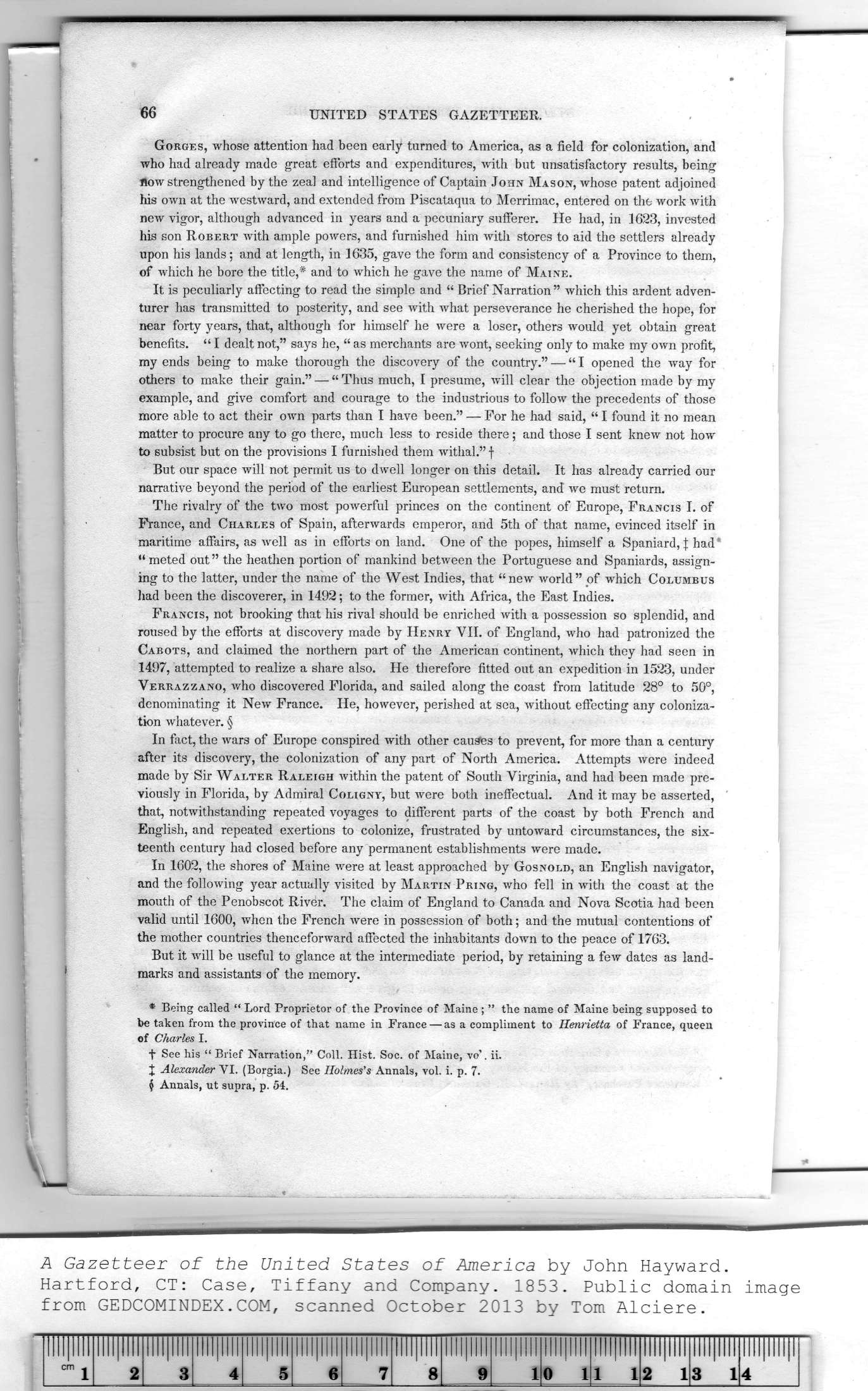|
|
Note: Ctrl and + increases the font size of the text below, Ctrl and - decreases it, and Ctrl and 0 resets it to default size.
66 UNITED STATES GAZETTEER.
Gorges, whose attention had been early turned to America, as a field for colonization, and
who had already made great efforts and expenditures, with but unsatisfactory results, being
now strengthened by the zeal and intelligence of Captain John Mason, whose patent adjoined
his own at the westward, and extended from Piscataqua to Merrimac, entered on the work with
new vigor, although advanced in years and a pecuniary sufferer. He had, in 1623, invested
his son Robert with ample powers, and furnished him with stores to aid the settlers already
upon his lands; and at length, in 1635, gave the form and consistency of a Province to them,
of which he bore the title,'* and to which he gave the name of Maine.
It is peculiarly affecting to read the simple and “ Brief Narration" which this ardent adven-
turer has transmitted to posterity, and see with what perseverance he cherished the hope, for
near forty years, that, although for himself he were a loser, others would yet obtain great
benefits. “ I dealt not," says he, “ as merchants are wont, seeking only to make my own profit,
my ends being to make thorough the discovery of the country." — “I opened the way for
others to make their gain." — “Thus much, I presume, will clear the objection made by my
example, and give comfort and courage to the industrious to follow the precedents of those
more able to act their own parts than I have been." — For he had said, “ I found it no mean
matter to procure any to go there, much less to reside there; and those I sent knew not how
to subsist but on the provisions I furnished them withal." f
But our space will not permit us to dwell longer on this detail. It has already carried our
narrative beyond the period of the earliest European settlements, and we must return.
The rivalry of the two most powerful princes on the continent of Europe, Francis I. of
France, and Charles of Spain, afterwards emperor, and 5th of that name, evinced itself in
maritime affairs, as well as in efforts on land. One of the popes, himself a Spaniard, J had
“meted out" the heathen portion of mankind between the Portuguese and Spaniards, assign-
ing to the latter, under the name of the West Indies, that “new world" of which Columbus
had been the discoverer, in 1492; to the former, with Africa, the East Indies.
Francis, not brooking that his rival should be enriched with a possession so splendid, and
roused by the efforts at discovery made by Henry YII. of England, who had patronized the
Cabots, and claimed the northern part of the American continent, which they had seen in
1497, attempted to realize a share also. He therefore fitted out an expedition in 1523, under
Verrazzano, who discovered Florida, and sailed along the coast from latitude 28° to 50°,
denominating it New France. He, however, perished at sea, without effecting any coloniza-
tion whatever. §
In fact, the wars of Europe conspired with other causes to prevent, for more than a century
after its discovery, the colonization of any part of North America. Attempts were indeed
made by Sir Walter Raleigh within the patent of South Virginia, and had been made pre-
viously in Florida, by Admiral Coligny, but were both ineffectual. And it may be asserted,
that, notwithstanding repeated voyages to different parts of the coast by both French and
English, and repeated exertions to colonize, frustrated by untoward circumstances, the six-
teenth century had closed before any permanent establishments were made.
In 1602, the shores of Maine were at least approached by Gosnold, an English navigator,
and the following year actually visited by Martin Pring, who fell in with the coast at the
mouth of the Penobscot River. The claim of England to Canada and Nova Scotia had been
valid until 1600, when the French were in possession of both; and the mutual contentions of
the mother countries thenceforward affected the inhabitants down to the peace of 1763.
But it will be useful to glance at the intermediate period, by retaining a few dates as land-
marks and assistants of the memory.
* Being called “ Lord Proprietor of the Province of Maine ; " the name of Maine being supposed to
be taken from the province of that name in France—as a compliment to Henrietta of France, queen
of Charles I.
+ See his “ Brief Narration," Coll. Hist. Soc. of Maine, vo'. ii.
+ Alexander VI. (Borgia.) See Holmes's Annals, vol. i. p. 7.
$ Annals, ut supra, p. 54.
|
